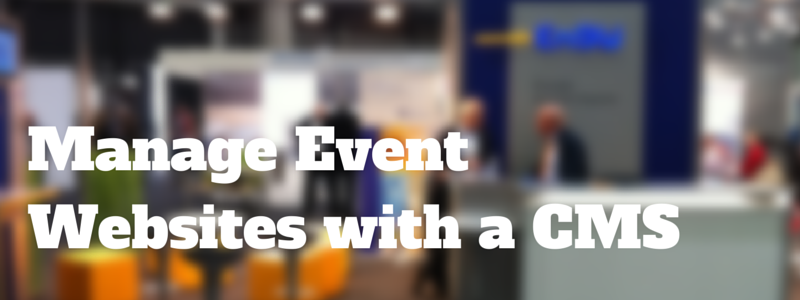
Event websites need constant updates. Every week you are adding speakers, sessions, sponsors and attendee information as you continue to nail down the details as part of the linear planning process. That information is coming from many different areas in your organization.
It Takes a Village to Plan an Event
The education committee is feeding the website team new session information and schedules as they are confirmed. The salespeople are adding new sponsors and exhibitors daily. The person responsible for housing is updating hotel information as room blocks get filled. Your attendees need the most up-to-date information in order to make the decision to attend your event.
It’s a complex process and dumping all this information on your website team to update and add is not the best way of doing things. A good
Content Management System (CMS) can add structure to the entire process and reduce the amount of repetitive work.
"If you can use word processing software such as Microsoft Word, you’ll be able to adapt quickly to working in the CMS."
Instead of adding a new session description by passing it along to the web team (to reformat for the website), it can be added right into the CMS by the person creating or collecting the information. No one needs to be an expert at HTML. If you can use word processing software such as Microsoft Word, you’ll be able to adapt quickly to working in the CMS.
Permissions and Workflow

Are you worried about all those hands in the pie? A good CMS system will allow you to give people access only to the areas they need to access and with
specific permissions such as editing but not deleting.
You can even create an
approval process that all new content has to go through before that content is posted live to the website.
This structure eliminates any confusion over the most recent version of content being approved that you often have when emailing documents back and forth for approvals. Not to mention there is little lag time for the content to go live once it is approved.
You don’t have to worry about someone wreaking havoc on the entire website if they make a mistake. Each person contributing content to the site will have permissions to do what they should be doing, and only in those areas they need to do it.
Sample Workflow Process for Events
Someone on your education committee would simply log into the system, add their new content as a draft and the approval process begins. Perhaps the next step is for the editor to look it over, and then the content is queued up for final approval and posting.
Empowering Event Planners to Independently Manage the Event Site
"Your IT or website administrator will appreciate a CMS."
Your IT or website administrator will appreciate a CMS system as well. No more emergency calls to drop everything and change that registration fee typo from $35 to $350. No more nagging about getting that keynote speaker’s bio and picture added so you can start promoting them. Instead, they can concentrate on keeping the website and the rest of the computer infrastructure running properly.
Bottom line, a good CMS system will put structure to the collection, processing, and posting of all the content flying at you from every different direction.
Related Reading
 According to data compiled by W3Techs, 62.1% of websites are NOT using a Web Content Management System (Web CMS).
According to data compiled by W3Techs, 62.1% of websites are NOT using a Web Content Management System (Web CMS).
Should your website use a Web CMS?
Read this blog post to discover 10 common website scenarios that make a Web CMS essential: increased traffic, scaling resources for growth, URL management, updating the look and feel, growing your team of content contributors and more.